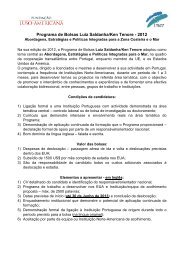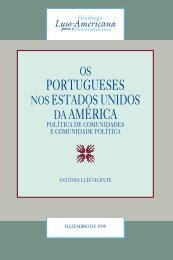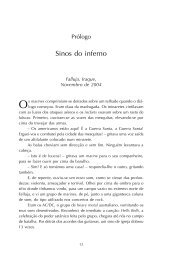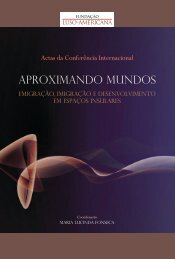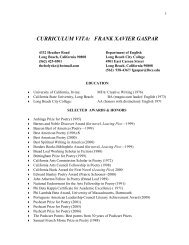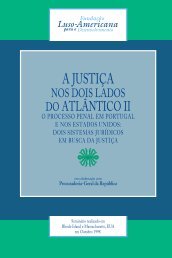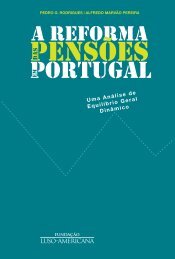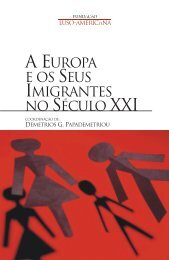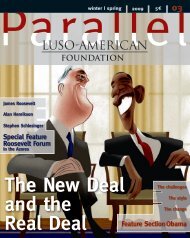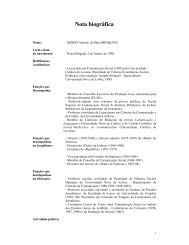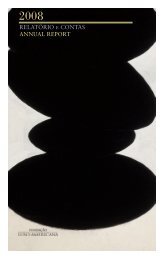A decade later - Fundação Luso-Americana
A decade later - Fundação Luso-Americana
A decade later - Fundação Luso-Americana
You also want an ePaper? Increase the reach of your titles
YUMPU automatically turns print PDFs into web optimized ePapers that Google loves.
France. The period of the constitutional<br />
monarchy had demonstrated a degree of<br />
openness, with article 6 of the Constitutional<br />
Charter allowing foreigners to practice<br />
other religions as long as their places of<br />
worship did not resemble temples. The<br />
1910 Revolution, however, introduced the<br />
concept of the secular state and laicism, in<br />
effect putting an end to the confessional<br />
state and instituting religious freedom by<br />
means of the law separating church and<br />
state.<br />
In Portugal, the anti-clericalism of the<br />
republicans clashed with a Catholic Church<br />
– still shaken by the annexation of the<br />
Pontificate States and by the laicism of the<br />
3 rd French Republic – but dogmatic nonetheless<br />
and obdurate to republican ideals<br />
and institutions to a degree that <strong>later</strong> on,<br />
many Portuguese Catholics refused to take<br />
part in republican institutions (though this<br />
was not the way Salazar saw it).<br />
“After April 25, 1974 we find not only<br />
political protagonists who had learned the<br />
lessons of the 1 st Republic, but a Catholic<br />
Church that is totally different, a result of<br />
Vatican II, more receptive to understanding<br />
democratic principles and the separation of<br />
church and state.” As Prof. Medeiros Ferreira<br />
reminded the audience, Pope Benedict XVI<br />
praised the separation of church and state<br />
when he visited Portugal.<br />
‘ The united states was the first country<br />
to set up a modern republic and the<br />
first system separating church from<br />
state, which was “very important<br />
because it contradicted the idea that<br />
there had to be a state religion.”<br />
’<br />
A FronTrunner,<br />
LiKe THe 25 TH oF ApriL<br />
Yet even though the topic is important in<br />
the birth of the Portuguese Republic – it<br />
was, in modern terms a “divisive issue<br />
– Medeiros Ferreira believes we must “discuss<br />
the Republic without placing the<br />
religious issue at the center of the debate.”<br />
In Ferreira’s opinion, there are factors<br />
involved that have received little attention<br />
because historiographers and analysts have<br />
fixated on the relations between church<br />
and state and on the political instability<br />
of the times. “These two issues have totally<br />
monopolized the analytical agenda<br />
when it comes to the 1 st Republic.”<br />
poLicy<br />
“in reality, the portuguese republic would carry on – by itself – until 1917, on a continent that<br />
was markedly monarchic and even imperial,” stated medeiros Ferreira.<br />
“It would also be worthwhile to focus<br />
on other issues that have gotten buried,”<br />
Ferreira observes, such as “the pioneering<br />
nature of the Portuguese Republican<br />
Revolution in the context of Europe.” He<br />
explains his outlook in<br />
these terms: “We always<br />
like to say that the 25 th of<br />
April Revolution was the<br />
precursor to the demise of<br />
the other dictatorships in<br />
Europe and South America.<br />
This is true; but the<br />
Republic was also pioneering<br />
in that it fostered the<br />
dissemination of republican<br />
regimes in post-World<br />
War I Europe” at a time<br />
when only France and<br />
Switzerland were republics.<br />
“But even so, it is safe to say that the<br />
Portuguese Republic did not come about<br />
by induction or because of external forces.”<br />
Ferreira stresses that “in reality, the<br />
Portuguese Republic would carry on – by<br />
itself – until 1917, on a continent that was<br />
markedly monarchic and even imperial.”<br />
The second point the professor stresses<br />
is the modernization program of the<br />
Republic. “Once the Republic is in place<br />
we witness the growth of the functions of<br />
a liberal state. It’s the state operating on the<br />
ground.” New public services spring up<br />
such as the civil registry, public education,<br />
compulsory military service and a new<br />
philosophy centered on participation.<br />
Thirdly, Medeiros Ferreira stresses the singularity<br />
of the Portuguese Republican Party<br />
which was different and unique in that it<br />
favored electoral tactics over insurrectional<br />
tactics. “No party at the time (and I’m<br />
talking in European terms) took power like<br />
the PRP did, with weapons, by force.” It<br />
wasn’t exactly a Bolshevist party but it<br />
wasn’t a classical parliamentary party either<br />
like the parties of the 3 rd Republic. It was<br />
an electoralist party of the masses… but<br />
insurrectional at the same time.<br />
Parallel no. 6 | FALL | WINTER 2011 39<br />
RUI OChÔA



